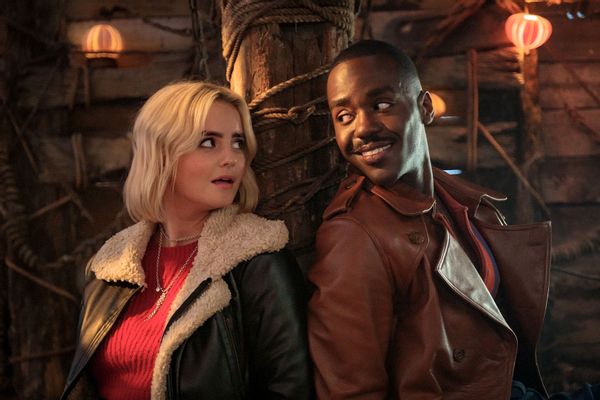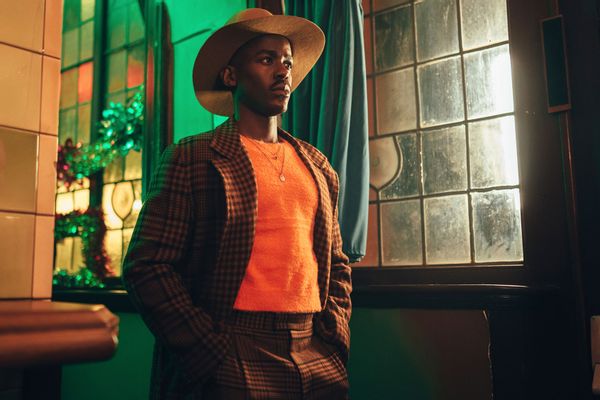
Ncuti Gatwa’s 15th Doctor came into our world pantsless. That was not the first clue distinguishing his era from tenures of past Time Lords on “Doctor Who” but it set the tone in a very way.
“Doctor Who” has spent 60 years establishing and reminding us of all the ways Time Lords differ from humans despite looking the same as some of us do. Gallifreyans have two hearts and can exist for billions of years.
They are not born, they regenerate, with subsequent incarnations wearing new faces and personalities while retaining the memories and experiences of former selves.
Well, most regenerate. At the climax of the third 2023 special, “The Giggle,” the 14th Doctor (who is also the10th, played by all-time fan favorite David Tennant) had been fatally shot by none other than the Toymaker, revived in our era by Neil Patrick Harris. Everyone around the Doctor including his best friend Donna Noble (Catherine Tate) and classic companion Melanie Bush (Bonnie Langford, featured in the 1986 and 1987 episodes), expected him to dissolve in a burst of energy and return as somebody else. That's what always happend before.
Except . . . he didn’t. A flummoxed Fourteen instructs Donna and Melanie to pull each arm, which they do . . . pulling Gatwa’s Fifteen out of his body. The Toymaker condescendingly calls them handmaidens but really, they’re midwives. Gatwa's Time Lord arrives in half of 14th’s clothes – the button-down shirt, casually undone tie, high-top sneakers, and cotton boxer briefs, leaving his predecessor in his undershirt and suit, sans sneakers.
It works, because Gatwa has the legs to pull it off. He doesn’t cover his bottom half until Christmas – and even then, the first getup we see him in is a kilt. At a nightclub. Where he’s dancing his ass off. The actor isn't shy about showing off his physique evident in his Doctor's tendency to leave his shirts unzipped to show off his sternum. Nor should he be! As Melanie declares at the first sight of the man, Gatwa's Doctor is beautiful.
As fantastical as “Doctor Who” can get, the cleverest being in the universe always has an explanation for everything. Gatwa’s Doctor was not born or regenerated but “bi-generated.” It’s supposed to be a myth, he says before cracking his neck and laughing brightly. “But . . . look at me!”
Look at him, indeed.
Also, since we can’t help it, look at Tennant. And look at Russell T. Davies, ushering in a rebirth for “Doctor Who” for a new age – the one on Disney+, But let’s put that aside for a moment and look at Tennant again. Why is his Doctor still around when Gatwa's so confidently owns the role from the moment he steps into the picture?
Festive season specials traditionally serve as handoffs between actors playing The Doctor, and “The Church on Ruby Road” follows that convention by introducing Fifteen to his first companion Ruby Sunday (Millie Gibson), an orphan plagued by a run of clumsiness that turns out to be caused by goblins who look a lot like the title monsters of "Gremlins.”

“Doctor Who” has always been a family show, something longtime viewers forget whenever The Doctor looks back on his trauma or unleashes his anger. Tennant was spectacular at the former, with his successor Matt Smith wielding fury with an arresting dimensionality.
Gatwa’s Time Lord, though, is purposefully different. He’s a sensitive hero with vigor and swagger, a traveler in love with the universe with all its faults and perils instead of wearied by its greed and destructiveness. He’s also the first modern Doctor since Christopher Eccleston to sport a leather jacket and be conscientiously fashionable.
If The Doctor’s clothes are an extension of his personality, the 15th’s funky drip hints his ride is one we don’t want to miss. Gatwa may have played a Ken in “Barbie” but his Doctor isn’t sexless; in one scene he explains his ability to escape the ropes binding him by saying, “I spent a long, hot summer with Harry Houdini.”
With Davies writing for Gatwa, elder Whovians may rest easy knowing this (bi-)generation will hold to the best of what “Doctor Who” was, both back in the day and back in the new day Davies ushered in between 2005 and 2010.
Yet it can’t be lost on those fans who never thought we'd see someone other than a white man step into this iconic role that Gatwa, other than being the first Black queer man to play The Doctor, is the first to share his reign with a previous Doctor.
Not just any incarnation, but the fandom’s favorite Time Lord, next to Tom Baker’s fourth.
Davies’ seasons with Tennant are the revived “Doctor Who's” standard bearers. Steven Moffat’s time was acclaimed too, but he worked under Davies, leaving Moffat a strong blueprint to expand upon.
Chris Chibnall, who came after Moffat and wrote for Jodie Whittaker’s 13th Doctor – another first, being a woman – could not benefit from that connection. So when both Whittaker and Chibnall left and Davies’ return was announced, many expressed relief. At last, a return to par, to the way it used to be – a mode of thinking The Doctor has proven to be wishful thinking countless times over the show’s six decades.
In finding a way for “Doctor Who” to move forward with Gatwa while anchoring itself to Tennant's past glory, Davies is striving to appeal to both the fantasts (some of whom are purists and possibly racists) and the futurists. That’s never going to make everybody happy, initially. But, given the business circumstance, some version of this strategy also seems inevitable.
Besides, Davies’ return via the three “Doctor Who” specials starring Tennant, and Gatwa’s first solo outing, “The Church on Ruby Road,” is more triumphant than not.
Fourteen’s return precipitates a reunion with his best friend Donna Noble (Catherine Tate). In the course of their new adventures, Davies introduces Yasmin Finney as Rose, Donna’s daughter, without simply dropping her in unannounced. “The Star Beast,” the first of the three, shows a brief glimpse of Rose contending with bullies and her well-meaning gran Sylvia (Jacqueline King) struggling to use the correct pronouns.
Rose is also the non-binary child helping to shoulder her mother’s binary burden — special, because of who she was born to be.
This is an affirming and elegant resolution to a trap that was supposed to split Tennant’s Time Lord from his best friend forever. In this universe, though, forever is constatnly taking detours.
Right-wing viewers have scoffed at “Doctor Who” in recent years for its supposed newfound push into social advocacy, ignoring that it has always had such leanings, same as all lasting speculative fiction. Much of it is faux outrage by small-minded attention seekers.
Most who watched this hour or “Wild Blue Yonder,” which momentarily shows The Doctor and Donna’s consequential encounter with Isaac Newton, probably didn’t care that the man who figured out gravity was played by a non-white actor Nathaniel Curtis (who worked with Davies in “It’s a Sin”), or that Rose is trans.
What matters more is that because The Doctor and Donna blew across Newton’s path, gravity isn’t called that anymore, and Donna, Rose and Shaun Temple (Karl Collins) are the loving family the 14th Doctor can claim as his.
But the fact that we’re talking about their adventures instead of expressly digesting Gatwa’s is frustrating. You could argue that this angle is also a choice, which is true, but it’s one we’re obligated to address prior to Gatwa’s tenure officially launching in the spring.
Using a previous actor and his iconic character as a bridge to a new era instead of relying expressly on the newcomer's talent and charisma may be a fruit of the production firm Bad Wolf's era of “Doctor Who.” For the first time since 1963, the show is no longer under the BBC’s control and is instead fully in Davies’ creative power along with Bad Wolf founders Julie Gardner and Jane Tranter, who worked with the show in 2005.
As for what Davies and “Doctor Who” gain more broadly from signing on Disney+ as its international distributor, watch the Christmas Special and the three leading up to it and see for yourself. Which is to say, a Disney-fied budget does wonders for its look.
Fetching as Gatwa is, The Doctors’ latest TARDIS is a modernist’s dream, all sweeping curves and ramps, along with the good old jukebox. The CGI is more polished, although Davies doesn’t entirely abandon the rubbery costumes and puppets that are a “Doctor Who” signature.
In exchange, “Doctor Who” may now go the way of other Disney IP and retry spinning off stories from the mother TARDIS, as the BBC once attempted with “Torchwood” and “The Sarah Jane Adventures.” That could be good . . . if Davies can keep a handle on the plot.

Davies invites us to marvel at Gatwa's Doctor, and the worlds around him, including ones on Earth we haven’t been accustomed to seeing on TV until recently. Where a white orphan can be raised by a Black foster mom and play in a band with a trans woman lead singer, and these details are simply that.
That same world can place a wrung-out, “thin as a pin” billion-year-old hero in a humble London home with his best friend, and at a workplace where a scientist, Shirley Bingham (Ruth Madeley, from Davies’ “Years and Years”) uses a tricked-out wheelchair and may be as clever as he.
That Davies would choose Tennant for this purpose makes sense, given the accommodations made to enable his Doctor to show his romantic yearning and loss.
The Black sci-fi viewer in me chafes at Davies’ choice to make Gatwa’s inauguration an offshoot of a longstanding character’s extensively developed emotional journey. That same part of me winced when the 15th Doctor kissed the 14th, saying “I got you,” because of the way it harkens to every all-knowing wise Black friend we’ve seen throughout the decades that “Doctor Who” has shared the airwaves with them.
The Whovian in me also softened at that same sight out of an old love for Tennant and a new one for Gatwa, who is part of a generation that’s less squeamish about men or male-presenting Time Lords showing physical signs of empathy and understanding.
The message at that moment revolves around how worn out Tennant’s 14th Doctor is from carrying the pain and guilt over people he couldn’t save with him all these years. It doesn’t serve him, and as Gatwa’s Doctor shows in “The Church on Ruby Road,” it doesn’t help those who need him either. There is only fixing what you can, claiming the victories that present themselves, and steaming full speed ahead.
So yes, we have two Doctors sharing an existence, but not necessarily stealing the other’s electricity. When Gatwa’s 15th Doctor responds to Tennant’s Doctor amazedly whispering “You’re me,” upon meeting him with, “No, I’m me . . . I’m really, really me . . . I’m completely me!” we can say for certain that he speaks the truth.
"The Church on Ruby Road” premieres Monday, Dec. 25 at 9:55 a.m. PT/12:55 p.m. ET, on Disney+, where "The Star Beast," "Wild Blue Yonder" and "The Giggle" are currently streaming.







